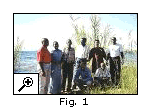|
|
 |
|
| |
The Environmental Education (EESS) special study formed a part of the LTBP training strategy developed by Rachel Roland and Monique Trudel. EE and training activities were often linked together and executed by the same national teams. 
A workshop for Environmental Education was held in March 1999, with the National Environmental Education Coordinators (NEEC, which was subsequently modified to TECC to encompass the training component) to clarify specific EE issues, roles and responsibilities and to prepare a draft work plan to be discussed and approved by the Project Coordination Unit, National Coordinators and the LTBP EE teams (Fig. 1, 2).
The draft work plan, developed by the four national teams, was adapted to specific national circumstances and needs.
Burundi
Following the decision to down grade the status of Rusizi National Park to a Natural Reserve and to reduce the protected area by 3000 ha, the Burundi EE team conducted a "journee de reflexion" with decision makers and members of the local community.

The park is a very rich and diverse ecosystem combining the lake environment with that of the Rusizi River. It is of great importance to the biodiversity of Lake Tanganyika. In an effort to make people aware of the importance of the Rusizi Delta for the biodiversity of Lake Tanganyika and for Burundi in general, The TEEC team organized a "journee de reflexion" with decision makers and local authorities as their target audience. National specialists on biodiversity, socio-economics, and environmental law gave presentations on: the park's biological resources, how and why the local populations are impacting these protected resources, and the legal status of such protected areas. Follow up activities are planned with other target groups of importance such as fishing communities and the population surrounding the park. Journalists will also be involved in the diffusion of the information by producing radio - television and written material to strengthen the messages.
DR Congo
Based on the findings of the other LTBP special studies executed by the Centre de Recherche en Hydrobiologie (CRH), the Congolese EE team identified as a priority, an education exercise about the impact of fishing practices in breeding sites and erosion in the lake catchment area, on the biodiversity of the Lake. The Congolese team chose to work directly with the lakeshore populations on these issues.
|
|